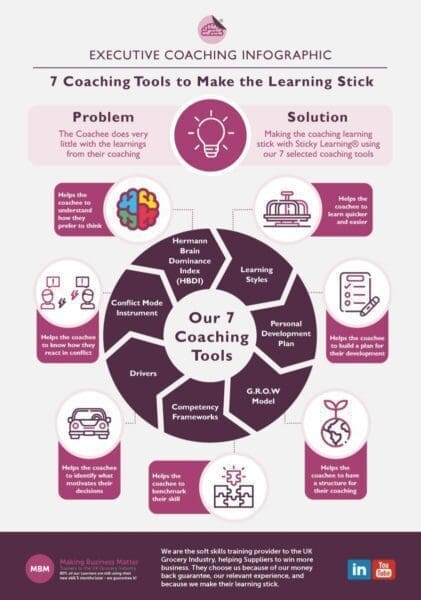Finders, Keepers – Britain’s Got Talent, Hang onto it!
The benefits of coaching are painfully apparent in the UK at the moment. We’ve been hearing for months about labour shortages, now here we are with the HGV driver crisis and petrol queues. More than ever, developing future leaders and managers involves spotting people’s emergent potential. You need to nurture talent in-house, not waste it.
As this article sets out, the benefits of coaching extend beyond raising productivity and smashing targets. Leaders and managers should take a longer view and use coaching to develop their teams. Coaching professionals bring external perspectives, but leaders and managers can also apply themselves to the task. And colleagues can coach each other effectively, in peer coaching. We look at different coaching styles and what works at different levels. Finally, if your business doesn’t believe in coaching, we consider the benefits of getting career coaching and moving on!
Coaching is the (Emotionally) Intelligent Thing to do
The fact is coaching works – all the way to the top. In a Fortune 100 study, 48% of leaders undergoing coaching showed increases in work quality. They displayed higher engagement and productivity, and improved effectiveness.
Coaching also gives leaders the opportunity to motivate and inspire their teams. From Goleman’s Leadership Styles work, leaders’ personal styles create about 70% of their business’s emotional climate. And this drives around 20%, or even 30%, of their profitability.
What is the Impact of Coaching?
In the classic transactional leadership model, businesses recruit people for specific jobs. Sure, they must be trained. But coaching can achieve so much more. For example:
- Contribute to leadership development.
- Create a positive and productive working environment.
- Improve employee engagement and retention.
- Boost individual output and organisational performance.
How Does Coaching Contribute to Leadership Development?

Here are some coaching functions that are specifically important in nurturing leadership:
- Motivating: Make people aware they are developing these skills. Encourage them to identify areas they want to focus on.
- Asking questions, but not answering them: This sounds un-helpful! But letting people come up with their own answers is critical to participation and growth.
- Setting goals, not tasks: Our mammal brains have evolved to learn from experience. We’re more likely to remember something with some “good” stress involved, like achieving a goal.
- Inspire: How much of a role model you decide to be, affects how fast your followers will want to grow
Elevator Going Up!
Coaching helps people at different levels in a business. Let’s look first at the general benefits.
What are the Benefits of Coaching in the Workplace?
Empower employees: Employees feel encouraged to come up with solutions and implement their ideas effectively. They gain confidence, knowing they can be proactive, making decisions that improve the company.
Enhance performance: People sometimes look good on paper and interview well, but don’t perform. Coaching can unlock their talent and fill in performance gaps. Even the most talented people can suffer drops in performance, through lack of guidance or feeling stuck for progression.
Encourage positive communication: A conversational coaching style encourages positive communication at all levels. People feel able to speak out and have honest discussions about issues and share their ideas with management. Leaders can identify areas for improvement and take early action. Coaching also helps build better client and customer relations. Train your team to have frank two-way exchanges, which identify concerns and improve working relationships.
Raise retention rates: Hopefully you’ll see this final benefit too, because people recognise your business is a good place to work. A coach or mentor can significantly reduce staff turnover so people stay longer. Nurturing employees helps them feel happier and enjoy meaningful relationships at work.
Top 10 Benefits of Sales Coaching

Motivating sales people is notoriously difficult, particularly big grocery salesforces. Also, FMCG sales managers are often promoted because they’re good at selling. Not because they know about coaching. Sales coaching can help:
- Improve internal communication skills.
- Inspire creativity.
- Improve understanding of products and services (especially what you’re selling!)
- Help the company prosper in difficult times.
- Boost revenue.
- Improve productivity.
- Help close bigger deals.
- Strengthen the organisation.
- Help bring in new clients and appease current ones.
- Improve employee satisfaction.
The last of these, improve employee satisfaction, maybe ought to go first in order of importance. But it doesn’t work like that!
What are the Benefits of Coaching and Mentoring Managers?
5 ways managers can benefit from coaching and mentoring are:
- Better management skills: Coaching and mentoring provide opportunities to develop and hone specific skill sets.
- Increased confidence: You have greater self-belief, and less risk of impostor syndrome and self-doubt.
- Greater self-awareness: What the situation actually is, matters less than your reaction. You learn to monitor how you respond to situations, and stay calm and grounded.
- Improved productivity: You see growth in your personal performance and your team’s output.
- Greater wellbeing: You feel more relaxed, happier and healthier. And you’re happier outside work.
There are no guarantees, of course. It’s down to the individual. But generally the effects are positive.
What are the Benefits of Executive Coaching?
At senior level, the main benefit of coaching is increased leadership effectiveness. Complex situations become clearer. You learn new ways to respond, and initiate what you want to achieve. Here are some specific benefits of executive coaching:
7 Executive Coaching Benefits
- Increased levels of motivation.
- Boost in acquiring knowledge and understanding.
- Improved leadership abilities.
- Better self-discipline.
- Heightened self-awareness.
- Higher levels of empathy.
- Better social skills.

What is the Role of Coaching in Leadership?
Leaders also get involved in coaching their staff. Coaching’s role in leadership is to communicate the desired results and lead your team towards your goal. People talk of coaching as a distinct leadership style, blending ‘affiliative’ and ‘authoritative.’ The experts say leaders and managers should aim towards flexible styles. Involvement with coaching opens you to being more flexible.
What Do You Learn From Being a Coach?
Here are two soft skills you’re likely to sharpen, coaching colleagues:
- Guidance
- Communication
You’re also bound to develop these leadership traits:
- Empathy
- Curiosity
- Positivity
- Persistence
- Innovation
- Sincerity
It’s Coaching, Jim, But Not as we Know it
Coaching styles are a similar scenario to leadership styles. It comes down to deciding what’s right for your particular situation. As we’ll see shortly, some very famous businesses are embracing some less conventional coaching styles.
5 Core Coaching Styles

Here are five different styles, each with their uses. The first two can feel particularly tough. But they are appropriate in times of change, when people need to respond quickly.
Authoritative
Here, the coach takes a firm role. They decide the coaching methods and processes. Opting for a more collaborative approach wouldn’t be beneficial when there’s extreme urgency. Or, only the coach knows enough to make the call. ‘Authoritative’ is also known as command style, because it doesn’t involve much team interaction. Instead the coach gives commands, which the team obey without questioning.
Vision coaching
This involves harnessing the power of thought to shape the future. The more we focus on a desired outcome, the more likely it is to happen. Vision coaching draws on elements of feedback, reflection and conversation to motivate and influence employees. It encourages and empowers by giving clear direction and strategies for achieving objectives and staying in focus. Intensive and short term, the downside is that this can feel like mind control. But it works.
The third style doesn’t feel like coaching. But it is.
Transactional
Here’s what you do, this is how you do it! A task-driven and time-limited style, this aims at promoting performance and avoiding stumbling blocks. But if people show they can do this work well, you can loosen the leash and promote them.
Democratic
The coach makes the final decisions after listening and considering the team’s thoughts. Democratic coaches outline their objectives, but don’t insist on a set way of working. They let people find their own route, while helping them along the way. The principle is, give teams accountability. Let them say what works best, then leave them to produce results. This takes a bit longer, but encourages the team to think things through. It’s an ideal scenario for coaching highly qualified professionals or technical experts.
Holistic Coaching
A rather different style, this has seen huge growth in popularity in recent years. Also known as workplace wellness programs, holistic coaching takes the person’s whole working life into account. It helps people reconnect with their organisation, focusing if required on repetitive behaviours that can negatively impact their work. Coaches also work on solutions like stress management and other relaxation techniques. This kind of coaching can take time, and deeper problems may surface requiring therapy, but it is effective. Businesses offering employee wellness programs include Accenture, Asana, Google and Microsoft.
First Among Equals – the Benefits of Peer Coaching

If this all sounds daunting, maybe you should consider peer coaching. This form of learning and development involves two or more colleagues working together, reflecting on current practices. They expand, refine and build new skills, share ideas and teach one another. Or they solve particular workplace problems. Anyone in the business with the right mind set, knowledge and skills to share can be a peer coach.
Peer coaching increases people’s view of their performance. It enables them to learn new skills and accelerate learning. Peer learning also creates a sense of camaraderie. And as a business, a peer coaching programme will make you more attractive to potential employees.
We Should See What Difference Doing Coaching Makes
Doing coaching will definitely impact your business. But for best results you should change your working culture as well.
What Does a Coaching Culture Look Like?
Feedback is vital: Coaching encourages employees at all levels to ask for feedback and take proactive action to improve their performance. Openness to constructive feedback promotes a healthy work environment. People can react badly to criticism. Better to raise concerns and address them with positive solutions.
Asking for help: Seeking co-workers’ assistance without seeming over-demanding can pose problems for some managers. That’s particularly true if you’re newly promoted and inexperienced. Conversational coaching will improve your personal skills. Learn how to ask for help in a considerate and reasonable way. You’re still the manager. You have your role, they have theirs. But this way you will break down perceived hierarchical barriers and create empathy. And get better results.
Be empathetic: Take time to understand the other person’s position and find how you can help. In the coaching scenario, this means listening to your people and seeing what skills input they would like. Empathy will give you a sense of what individuals want – and if you’re giving it to them.
Benefits of a Coaching Culture
- Increased engagement.
- Greater collaboration in the workforce.
- Development of people and performance.
- Improvement of creativity and agility.
- Increased responsibility in employees.
- Newly formed change management capabilities.
In this list, improved agility and new change management capabilities will provide the resilience that businesses increasingly need.
I Want to Know if all This is Working!
What is Effective Coaching?
Those well-known pandemic experts the World Health Organisation also know a fair bit about effective coaching. They say: “Effective coaches are those who are coachable themselves. Their motivation is the goal of improving their practices. They are willing to be observed while working and will openly answer questions about their own performance.”
That’s a challenge to business people coaching teams! Here’s how you could do it better:
4 Steps to Improve the Quality of Your Coaching
Measure what you’re doing: Ask team members about the consistency and effectiveness of the coaching they’re getting. Listen to their feedback and act on it.
Educate and train: Look at how the coaching process works. Training shouldn’t be ‘Powerpoint, learn this, quiz at the end.’ Ideally it’s about making people grow.
Implement: If several of you are coaching colleagues in your business, share! ‘Information huddles’ let you collaborate about what’s working, and be honest about what isn’t. If you’re the only person involved with coaching, find a colleague and talk your concerns through with them. See Peer Coaching, mentioned earlier.
Track and analyse: Keep tabs on the coaching sessions you are running, whether new business presentations, sales training or whatever. Follow them up.
This track and analyse stage is where Gibbs Reflective Cycle (LINK) comes in. Build reflection into the follow up process, and use it to improve the experience. (Stay focused on why you’re training your upcoming leaders.)
And Finally: If Your Boss Says This, Leave…

The sad reality is that many business leaders don’t REALLY believe in coaching. They pay it lip service. Or they deflect and point to the disadvantages of coaching.
Here are some negative statements people use to justify why they’re not doing coaching:
- “It takes time for the coaching leadership style to be effective.”
- “Coaching leaders must be skilled in leadership.”
- “Mentoring isn’t always the right approach.”
- “You need specific coaches for a particular situation.”
If your boss says any of these things when you ask about coaching, maybe you should get some career coaching and move on.
Discover the Benefits of Career Coaching
Career coaching will help you understand yourself, from a career and work perspective. You’ll become clear and focused about what to do next, and get an external take on your situation. And last but not least, career coaching will help you identify a role and an employer profile where you will thrive. Go for it!
Check out our Free Coaching Skills Ultimate Guide.




